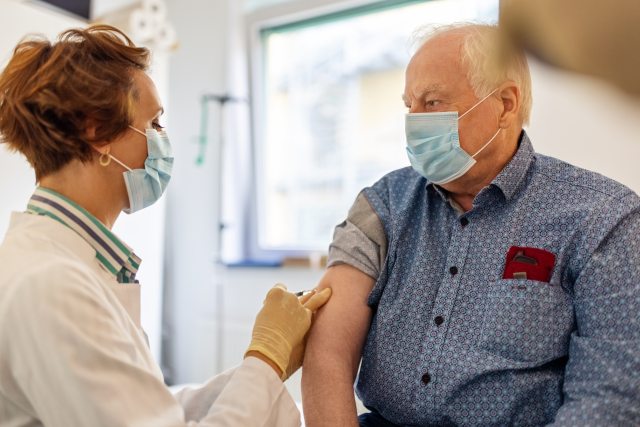How to protect yourself and your family against flu, COVID-19, RSV and more
| Healthy You | Safety | Wellness

Don't skip the shot. See why vaccines are so important this fall.
When seasons change and people start spending more time together indoors, it’s easy to catch a bug that makes you feel lousy.
That’s why healthcare providers encourage people to get their annual flu shot and other recommended vaccines.
While the pandemic has eased, it’s still possible to get COVID-19. And last year’s alarming spike in RSV (respiratory syncytial virus) made everyone aware of the need to guard against similar harmful viruses.
“We want to help people avoid all the nasty bugs that can spread in families and communities,” says Kristen Tremaine-McCarthy, MD, a family medicine doctor at PeaceHealth in Vancouver, Washington.
Review with your provider
So what can you do to stay healthy this fall? Talk with your provider about the vaccines you and your family shouldn’t skip.
The Centers for Disease Control recommends getting the flu shot by the end of October. An updated COVID-19 vaccine and a new RSV vaccine are also expected to be available.
Besides seasonal shots, check to see if you or a loved one are due for a vaccine dose for other preventable illnesses such as:
“You don’t want to take these illnesses lightly. Being immunized is far preferable to trying to recover from any one of them,” says Dr. Tremaine-McCarthy.
Besides potentially saving you from getting sick, immunizations:
- Cost less than being treated for the illness it protects against.
- Prevent lost work or school days due to illness.
- Reduce the spread of sickness in communities.
Vaccines play a big role in keeping groups healthy. Because of that, you or your family might need certain ones to travel or enter a school or day care. To learn more, read the frequently asked questions about immunizations for parents.
Protect yourself and others
Being vaccinated can keep you from getting sick. What’s more, it may protect someone else who can’t have one, including babies and older adults.
“Not everyone can take vaccines. It can be risky for people with fragile health,” Dr. Tremaine-McCarthy says.
Do you have concerns about possible side effects? Or do you have questions about different types of vaccinations available? Your provider can help you weigh the risks and understand which one might work best for you.
Other ways to stay healthy
Getting vaccinated is just one line of defense against viruses. You can also remind your family about these ways to protect yourselves from getting sick:
- Boost your immune system. Eat healthy food. Move every day. Get rest. Drink water.
- Clean your hands. It’s the most effective way to stop germs, according to research.
- Stay informed about the flu, COVID-19 and RSV. Be aware of the spread in your community. If there’s a spike in cases, you can change your plans to limit your exposure.
It’s rare to get through the fall or winter without some illness in your home. By taking good care of yourself and getting the recommended vaccinations, you have a better chance of fewer sick days and more quality time with your family.






